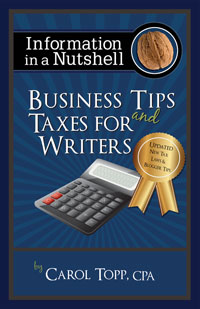Should an author release his rights to a charity?
September 2nd, 2013 → 9:37 am @ Carol
Currently I am the co-founder of a nonprofit called the War Writers’ Campaign, Inc https://warwriterscampaign.org/ . Currently we are developing a contract which allows for the total release of all rights to an author’s work for charity purposes.
Does anyone know if this is in fact legitimate in having an author sign over the rights entirely to an organization? Does this violate any copyright laws, state of federal?
Essentially authors would be signing over their work completely for charity purposes in order to raise money for veterans.
Not only am I a co-founder of this organization, I too am a writer and I will be sacrificing one of my books entirely to this organization. Also note, there will likely be a royalty, however it is still in debate as what percentage exactly since IT IS FOR CHARITY….
Any suggestions or guidance in this would be very helpful.
Derek Porter
Derek,
Your generosity is admirable.
You wrote,”I will be sacrificing one of my books entirely to this organization. Also note, there will likely be a royalty, however it is still in debate as what percentage exactly since IT IS FOR CHARITY….”
So the charity will pay you a royalty? The charity will be the publisher and copyright holder?
Make sure the charity’s original 501(c)(3) application allowed for publishing. If it did not, the charity can lose it’s tax exempt status for one activity outside its original exempt purpose. The charity may need to request a Private Letter Ruling from the IRS to add this additional activity to its charitable purpose. Unfortunately these Private Letter Rulings are expensive. The IRS charges the organization $3,000 to make a ruling!
Also, publishing by a charity is often suspect in the eyes of the IRS. It looks too much like commercial publishing. Your charity may have to pay unrelated business income tax on the publishing activities.
The IRS has a white paper on publishing by charities. I recommend you read it carefully: https://www.irs.gov/pub/irs-tege/eotopice88.pdf
In general, I would advise against any author releasing all their rights to the charity. What if the charity folds? What happens to the rights then? All assets of a 501c3 charity must go to another 501c3 upon dissolution so the authors will have no say in what happens to their work. Also, even though you founded this charity, the board could dismiss you yet keep the rights to your work. You would then be unable to take your work elsewhere. This may be unlikely, but it does happen!
It’s really not necessary for the author to give up his rights to the charity. The charity can act like a publisher and spell out the rights in the contract.
Carol Topp, CPA


Alan Drabke
11 years ago
This is the best question of the year! What about setting up a family run scholarship foundation? How do I link up with a college / university so my royalties are safe from nuisance law suits and my royalties support my family and provide scholarship monies for deserving students?
Steve Grant
11 years ago
Carol:
This question is a very interesting one that I saw on your site after I met you on Saturday at the Children’s Book conference in Strongsville.
Without providing a legal opinion on this, I would point out that a difficulty posed to all artists by the tax code is that the law allows a charitable deduction amounting to the artist’s basis (cost of producing) and not in the value of the work donated. This would reduce the value of an oil painting to the cost of the paints and the canvas and there might not even be an allowance for the “wear and tear” on the paint brushes. For a literary artist, there may be even a lesser cost basis associated with transfer of a copyright.
On the other hand, I believe that the assignment to the charity of the right to receive royalties paid by a publisher would be handled differently.
Carol
11 years ago
Thanks for your comments, Steve. Readers, Steve is an attorney with a specialty in copyright law. We met as speakers at a writers workshop in Cleveland.
Carol Topp, CPA
Tax Deductions and other IRS Matters for Authors | WD Ghostwriting Services
11 years ago
[…] “Tax Return Tips Every Writer Should Know About“-This post has only 83 words, but each word is powerful. Learn whether or not you should file a tax return and whether you can claim your book expenses alongside your business expenses. I also recommend that you read “Common Tax Mistakes Made by Writers,“ […]